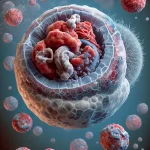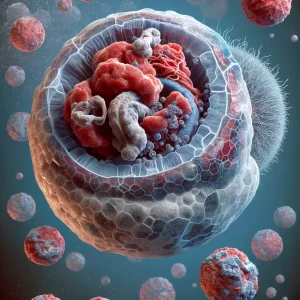What is Orchitis?
The medical diagnosis of orchitis refers to a pronounced inflammation occurring within the substance of one or both testicles. These male reproductive glands, housed inside the scrotum, become swollen and can be intensely painful when this condition develops. It represents a direct inflammatory assault on the testicular tissue itself.
In many instances, orchitis does not occur as an isolated problem. Inflammation often begins in the epididymis, the tightly coiled tube situated at the back of the testicle that stores and carries sperm. When the inflammation spreads from this adjacent structure directly into the testicle, the condition is more accurately classified as epididymo-orchitis. This combined inflammation is the most common presentation when a bacterial source is involved.
Causes:- Systemic Viral Infection: The most historically recognized trigger is the mumps virus. In this scenario, the virus affects the entire body, and as a complication of the illness, it can spread through the bloodstream and settle in the testicles, inciting a strong inflammatory reaction.
- Bacterial Spread from the Urethra: In sexually active men, bacteria responsible for sexually transmitted infections (STIs) like chlamydia and gonorrhea are a primary cause. These organisms can ascend from the urethra through the spermatic ducts to first infect the epididymis and then extend into the testicle.
- Migration from the Urinary Tract: In older men, particularly those with an enlarged prostate or who use a urinary catheter, orchitis can arise from non-sexually transmitted bacteria. These bacteria from a urinary tract or prostate infection can travel backwards through the plumbing of the urinary system to seed an infection in the testicle.
- Lack of Mumps Immunization: Men who were never vaccinated against mumps as children, or whose immunity has waned over time, remain completely unprotected from contracting the mumps virus, a primary cause of viral orchitis.
- High-Risk Sexual Behaviors: Engaging in sexual activity, particularly with multiple partners or without consistently using condoms, directly elevates the chance of acquiring the chlamydia or gonorrhea bacteria that are responsible for most cases in younger men.
- Being an Older Male with Urinary Issues: Men over the age of 45, especially those who have structural problems in the urinary tract or an enlarged prostate (BPH), face a higher risk of bacterial orchitis stemming from urinary tract infections.
- Use of an Indwelling Catheter: Having a long-term urinary catheter provides a constant physical pathway for bacteria to enter the bladder and urinary system, creating an opportunity for infection to spread to the testicles.

